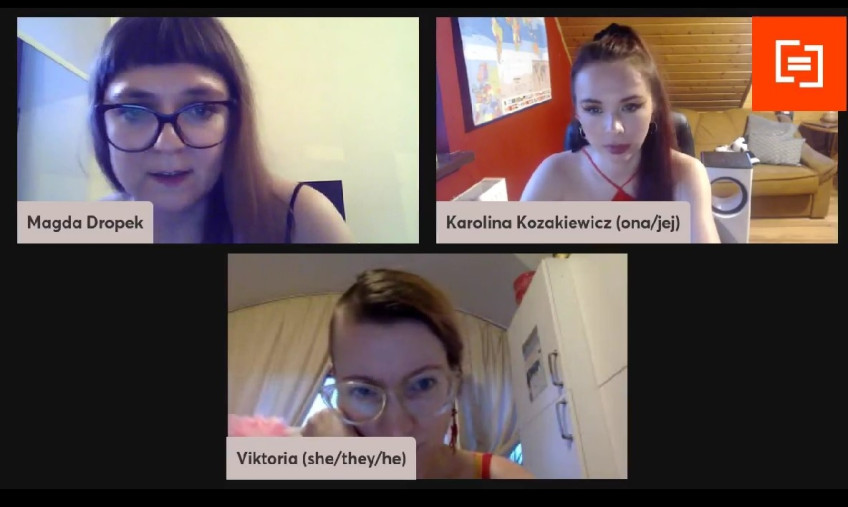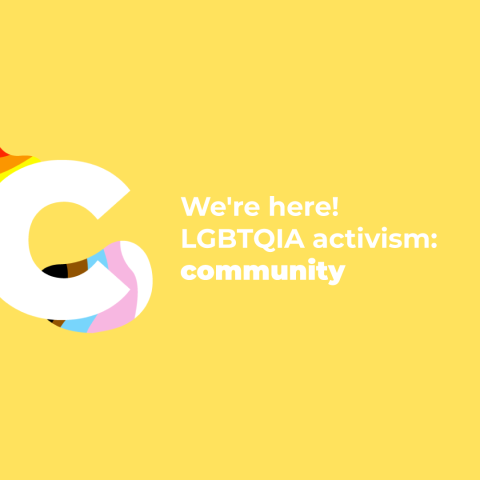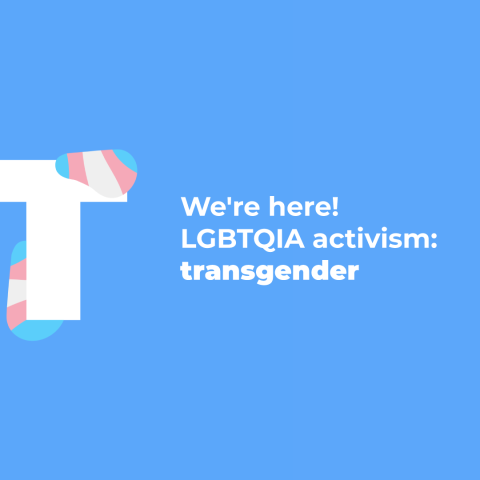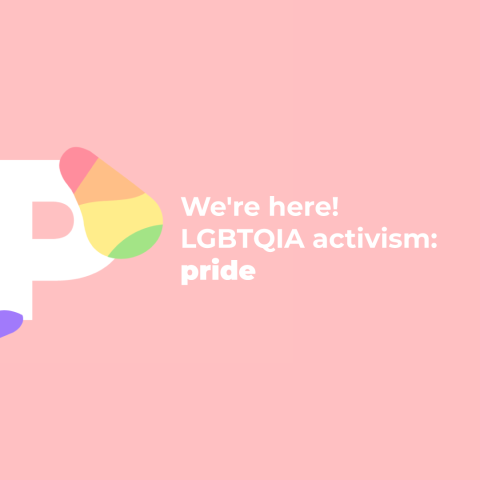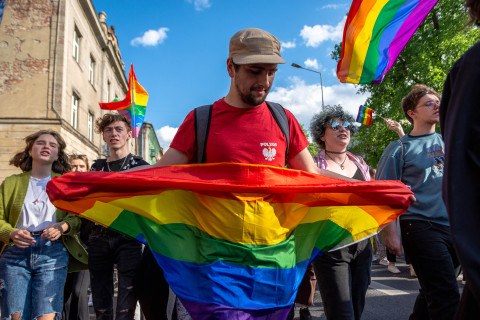Viktória, what is the official statement of Hungarian Psychological Association on asexuality? In Poland you can hardly hear that psychological students learn about sexuality as another orientation that is equal to heterosexuality, bisexuality, or homosexuality. For example, in US Psychological Association, they do acknowledge asexuality as another sexual orientation, but on the other hand, World Health Organization, they don’t. And it’s kind of all connected to politics, and they don’t want to be controversial. I think the same here in Poland. And I wanted to ask you Viktória how about Hungary?
Viktória: Well, the situation here is no better either. The Hungarian Psychological Association has an LGBTQ section and LGBTQ, they stop by the “I” and they kind of don’t acknowledge us, and it’s like we didn’t even exist. I think that they think that “Q” can cover asexuality, but they don’t really do anything about us. They work a lot with gay rights and trans rights, and sometimes it seems as if they simply don’t have resources. Right now our association, the Hungarian Asexual community which has existed for more than four years now, we are working on a booklet in Hungarian which is about Asexuality and which can be used by psychologists and other experts like school experts and doctors and so on. But we are mainly doing this. So psychologists can work with us to get first those kinds of information in Hungarian language. Unfortunately though Hungarian psychologists who may have nothing to do with the Hungarian Psychological association’s LGBTQ section, most of them kind of thing that asexuality is an illness caused by trauma or a hormonal imbalance, and it’s something that has to be cured. Fortunately, we are seeing more and more psychologists who are kind of accepting and who are trying to acknowledge that we do exist, and we do not have to be cured. But we still have a very long way to go, and our association knows more personal stories where someone who was asexual and went to a psychologist maybe with something totally different and the psychologists tried to convert these people. You know, you are not ace, you just need to get laid or you just, you know, need to find yourself, or maybe you’re traumatized and so on. So we are trying to compile a list of psychologists who are accepting, and our list is very short, I have to tell you.
How you have been working to change that? What’s going on in Hungary in the sense of this situation? Is the situation improving, considering also our visibility as queers?
Viktória: I think that our situations are quite similar because a couple of years ago in Hungary you couldn’t hear about Asexuality. I said that the organization is a bit more than four years old and we have a Facebook group which has existed a bit longer. When I started to work as an AIDS activist, exclusion was quite strong. And now the situation is getting slowly better. We have, of course, more organizations in Hungary and most of them do work together with us. They acknowledge that we exist. For example, in the capital Budapest, we have Budapest Pride, and we always have an event at the Pride Month, a picnic or a workshop. And this is kind of a tradition now because this year we have had our fourth workshop. So since we are so young, for us, it’s a long tradition and the picnic was actually a great success. More than 65 people came, so for us, it’s like thousands of visitors. And there are other organizations with which we can work together. But on the other hand, there are some peer organizations which kind of when they do research, they work with LGBTQI people and that’s where it stops. And I think it would be quite important to see how the Hungarian Ace community is vary, because we have research data from the US. But we don’t really have research data from Hungary. And it would be quite important because our research from the US says that aces are very much discriminated against a lot more than even gay people. But in Hungary I can’t tell you anything because we simply missed a data. I have written two masters’ thesis on asexuality, but it was qualitative research. So I made 10 interviews. And of course you cannot generalize my experiences. But what we can see in our organization and in our group on Facebook, which now has almost 2000 members, we can see that exclusion is still quite strong. And I’m not saying this because I’m an optimistic person, I can really see some change for the better. In Hungary, we have two prides, one in the capital, and we have another Pride in a city which is called Pécs. It’s in the south of Hungary. And we actually have been invited to hold a workshop there. So they are quite inclusive, which I am very happy about. One big problem is that it is very, very easy to misunderstand asexuality I have personally seen many people who are trying to be supporters, but for them asexuality kind of means no sex. And every time I try to tell them, asexuality is a total or partial lack of sexual attraction, and it has nothing to do with if you have sex or whatever you do in bed or under the shower, it kind of sometimes doesn’t go into their head. So I think when you do activism, it’s quite important that you know what words to use and that you have to make sure that you can get your point across. What’s interesting even if we have supporters, it’s like, okay, you don’t want to have sex, fine. And then they kind of thing, well, I had two weeks in my life and I didn’t have sex. So for me, it’s not real support.
Do you have many people interested in activism? Do you have like a big team or no?
Viktória: Again, I have to say that the situation is kind of like in Poland. We don’t really have many activists. And I think it has to do with the fact that being ace is totally unsexy. And when I say unsexy, I mean it’s something you get pitted for, or maybe you get bullied for. And don’t get me wrong, Hungary is very homophobic and transphobic. Hungarians hate everyone who is not totally like them. So it’s not easy to be gay in Hungary either. But being ace in Hungary, it’s so different from everything people want and people expect that it’s even very hard to just show your experiences and show that you exist, and you are totally fine. We just had a festival last week here in Budapest, and I was living book there, which means that people could lend me and open me like a book and read me, so they could talk to me. And there were many people who were very interested and open and everything. And one of them told me, I feel so sorry for you. And I could see that she really meant it, and she was trying to be nice, and I was like, you don’t have to feel sorry for me, I’m totally fine the way I am. And she said, but you should feel the same. I do. And I’m like, but I’m not you. So we have totally different experiences. So I think if you work as an ace activist, you really have to be hard because you will meet bullies.
But I think younger people, they kind of grew into this and I think they will be able to talk about it using their own experiences and so on. So when I think about the future and the future of ace activism, I am actually very positive. But I think we have to concentrate on the activists are people as well.
What is important in your activism and how do you take care of yourself and your community?
Viktória: For us, the first thing is we want to spread information and we want to spread information in a way which can be understood. And it’s not on a very high academic level, because it’s quite important that we can talk about asexuality with everyone. So it’s not only research based off, we can talk about our own experiences and so on. The second very significant thing for us is to help our community. Every research shows that around 1% of the population is asexual. This number might be actually a bit higher, but let’s stick with this 1% because it’s an easy number to handle. In Hungary, we have more or less 10 million people, a bit under 10 million, but whatever. So it means there are 1000 ace people in Hungary and our group has a bit under 20. So we could only reach a very tiny bit of the ace population. And of course it can mean that many people do not have access to Internet and so on. So we really have to get off social media and try to get to people. That’s why we hold workshops in other cities and the capital. That’s why we try to write booklets which can be handed out offline and can be read by anyone in Hungarian, of course. And it’s very important for us. Karolina you were talking about pride and feeling proud, and I think it’s a very important thing that being ace is nothing to be ashamed of. For me, I always think of it as the color of my eyes. I did not pick that. I got it, and I’m totally fine with it. It’s not something that makes me better than anyone else, but it’s not even something that makes me worse than anyone else. So it’s just a part of me. And I think it would be quite essential that every ace person understands this. In our Facebook group, very, very often we have people who post it’s so good that you exist. I had the feeling that something was wrong with me my whole life, but now I can see that you exist. I can see that there are people like me. So I do not feel so alone. And I think if someone feels that way their entire life, then we really should do something about it.
So for me, activism is very important because of this, to show people that there’s totally nothing wrong with them.
Funding for “We’re here! - LGBTQIA activism in a challenging environment” is provided by the U.S. Department of State's Bureau of Educational and Cultural Affairs with Meridian International Center as the implementing partner.

